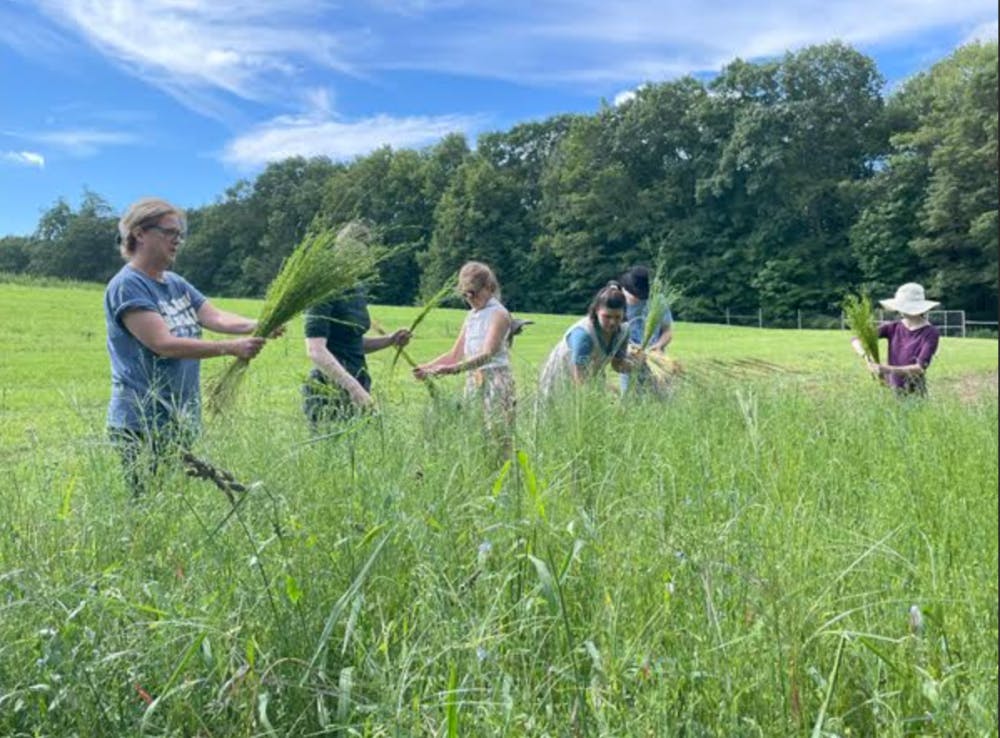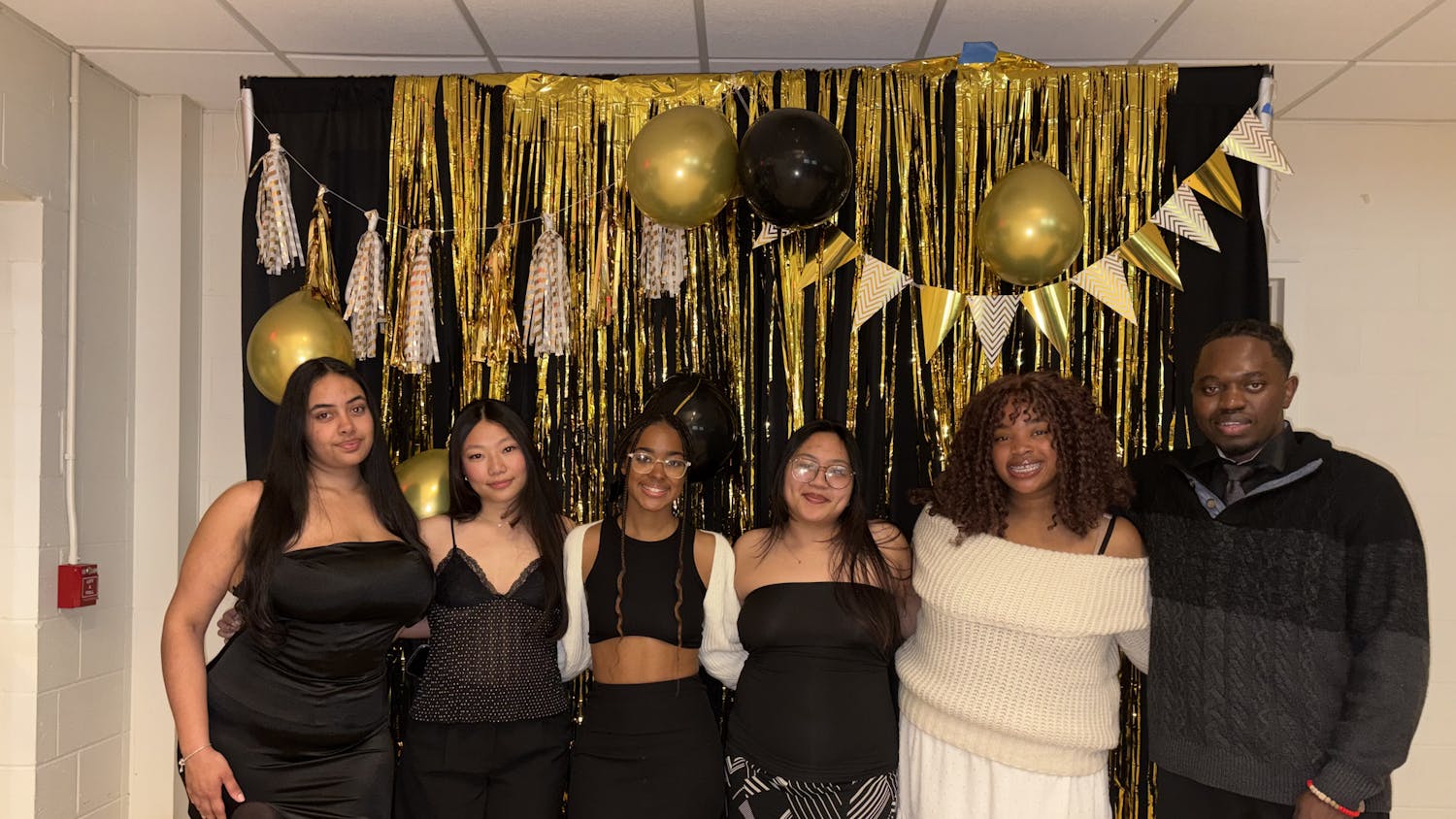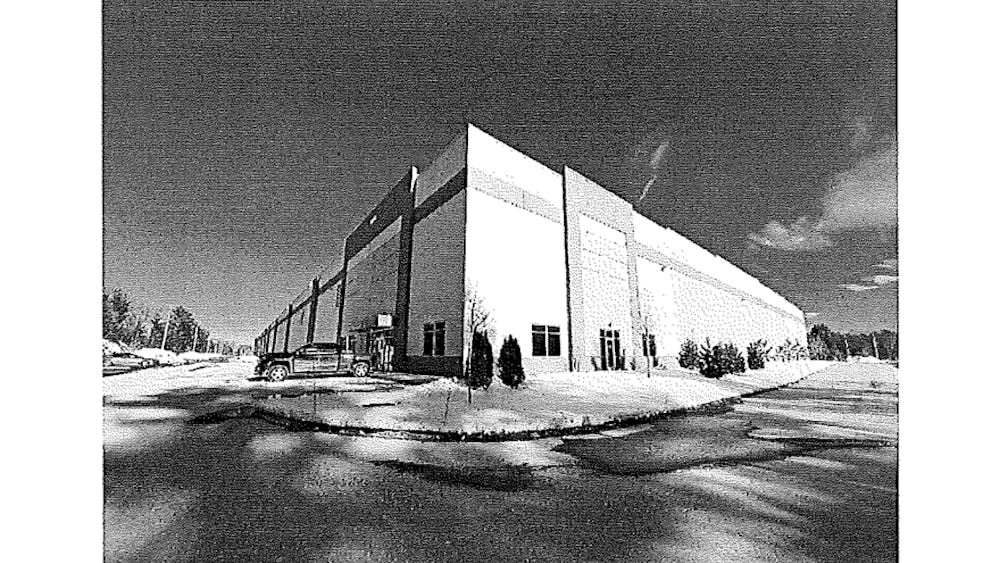The Flax to Linen Project is an ongoing project that began in Professor Kimberly Alexander’s 'Homespun to Fast Fashion' course. As she discussed how significant linen was to New Hampshire’s early economy, students became intrigued with the idea of growing the flax to produce it. In just two days, Alexander had secured a plot of land at the Woodman Agricultural Research Farm to plant the flax.
Alexander is a senior lecturer at the University of New Hampshire and the director of the Museum Studies program.
In the summer of 2023, Alexander and her team planted the flax seeds. They are currently breaking down these harvested fibers to spin them into linen thread and eventually produce clothing.
On the topic of long-term goals for this project, Alexander said, “Well, there is, in fact, a group known as the Northern New England Fibershed, and they are currently exploring options for doing a new startup manufacturing to produce linen once again in New Hampshire. So this idea of bringing the agriculture, the historic knowledge, the tools to be able to then bring something back and use a local workforce to create textiles in New Hampshire would be really quite extraordinary.”
Beth Gallucci, A graduate student on this project who was in Alexander's Homespun to Fast Fashion course, was involved with the planting and harvesting of the flax and the research behind it all. Delving into old diaries and papers, Gallucci immersed herself in the project.
“Working with Matthew Patten’s diary was a once-in-a-lifetime experience, as it led me to research his personal papers at the State Library of New Hampshire. These papers, preserved by his daughters, consist of over nine boxes of invaluable documents for studying life in 18th-century New Hampshire. Engaging with them made me feel as though Matthew Patten were a part of my family,” said Gallucci.
Gallucci also curated the exhibit for this project, 'Combing History: Flax and Linen in New Hampshire,' at the Woodman Museum in Dover, New Hampshire. Along with the help of other students and volunteers, this exhibit ran from April to November 2024.
With the Flax to Linen Project in its second year of production and advancing closer to their first goal of weaving together a handkerchief or a small vest, writer and director Catherine Stewart has arrived to create a documentary for the project. This 15-minute short film will premiere at UNH in March 2025.
“This is centered on the revolutionary act of growing a crop, turning it into fabric, and, ultimately, turning it into a garment with your hands, then adding on the layer of what that means for your community and the region. I always felt at peace among the flax, and that's what I wanted to evoke with this film,” said Stewart.
Graduate student Sydney Rue helped to plant, grow, harvest, and process the flax for this project.
“The Flax Project highlights the labor and expertise of the women, children, and enslaved people who carried out the crucial and often thankless labor of growing flax,” Rue said.
Growing flax in New Hampshire was difficult in 2023 due to immense rainfall. Flax faces the opposite problem this year: extended heat and drought in 2024, which have produced a less robust crop. Regardless, the project prospers.
“It's a learning process. So each year that we do this, we learn something new, whether it's the type of seed that we plant or the way that we plant it,” said Alexander.
“One of the highlights from this project was standing in a field of flax and knowing that we had done it. Standing in a field of bright green, gently waving flax felt like a miracle. No matter what happened from there, we had grown flax. There was an immense feeling of accomplishment and joy,” said Rue.
The upcoming short film will convey all of the hard work and emotion revolving around this project.
“It is a beautifully compelling short documentary that unravels the intricate journey of flax transforming into linen, showcasing the power of our connection to the natural world through craft tradition,” said Stewart.
Alexander is a senior lecturer at the University of New Hampshire and the director of the Museum Studies program.
In the summer of 2023, Alexander and her team planted the flax seeds. They are currently breaking down these harvested fibers to spin them into linen thread and eventually produce clothing.
On the topic of long-term goals for this project, Alexander said, “Well, there is, in fact, a group known as the Northern New England Fibershed, and they are currently exploring options for doing a new startup manufacturing to produce linen once again in New Hampshire. So this idea of bringing the agriculture, the historic knowledge, the tools to be able to then bring something back and use a local workforce to create textiles in New Hampshire would be really quite extraordinary.”
Beth Gallucci, A graduate student on this project who was in Alexander's Homespun to Fast Fashion course, was involved with the planting and harvesting of the flax and the research behind it all. Delving into old diaries and papers, Gallucci immersed herself in the project.
“Working with Matthew Patten’s diary was a once-in-a-lifetime experience, as it led me to research his personal papers at the State Library of New Hampshire. These papers, preserved by his daughters, consist of over nine boxes of invaluable documents for studying life in 18th-century New Hampshire. Engaging with them made me feel as though Matthew Patten were a part of my family,” said Gallucci.
Gallucci also curated the exhibit for this project, 'Combing History: Flax and Linen in New Hampshire,' at the Woodman Museum in Dover, New Hampshire. Along with the help of other students and volunteers, this exhibit ran from April to November 2024.
With the Flax to Linen Project in its second year of production and advancing closer to their first goal of weaving together a handkerchief or a small vest, writer and director Catherine Stewart has arrived to create a documentary for the project. This 15-minute short film will premiere at UNH in March 2025.
“This is centered on the revolutionary act of growing a crop, turning it into fabric, and, ultimately, turning it into a garment with your hands, then adding on the layer of what that means for your community and the region. I always felt at peace among the flax, and that's what I wanted to evoke with this film,” said Stewart.
Graduate student Sydney Rue helped to plant, grow, harvest, and process the flax for this project.
“The Flax Project highlights the labor and expertise of the women, children, and enslaved people who carried out the crucial and often thankless labor of growing flax,” Rue said.
Growing flax in New Hampshire was difficult in 2023 due to immense rainfall. Flax faces the opposite problem this year: extended heat and drought in 2024, which have produced a less robust crop. Regardless, the project prospers.
“It's a learning process. So each year that we do this, we learn something new, whether it's the type of seed that we plant or the way that we plant it,” said Alexander.
“One of the highlights from this project was standing in a field of flax and knowing that we had done it. Standing in a field of bright green, gently waving flax felt like a miracle. No matter what happened from there, we had grown flax. There was an immense feeling of accomplishment and joy,” said Rue.
The upcoming short film will convey all of the hard work and emotion revolving around this project.
“It is a beautifully compelling short documentary that unravels the intricate journey of flax transforming into linen, showcasing the power of our connection to the natural world through craft tradition,” said Stewart.













